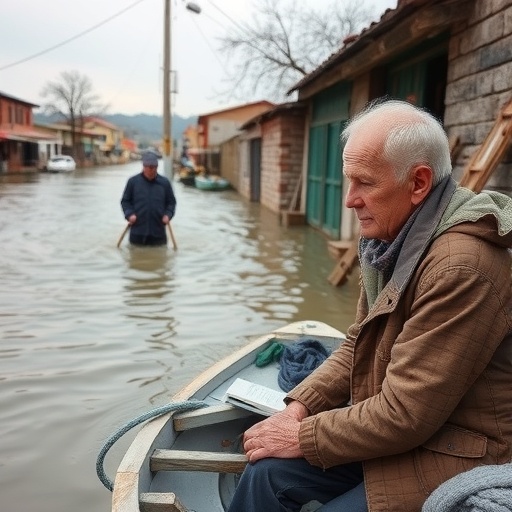In a comprehensive new study published in BMC Geriatrics, researchers delve into the profound experiences of elderly individuals who have endured flood disasters in the Western Black Sea region of Türkiye. This phenomenological study sheds light on the emotional and psychological aftermath faced by this vulnerable demographic after such catastrophic events. As floods become increasingly devastating due to climate change, understanding how the elderly cope with these challenges is more critical than ever.
Floods are not merely natural disasters; they disrupt lives, devastate communities, and impose long-term mental health repercussions. Elderly individuals are particularly susceptible to these impacts, given their potential mobility limitations and existing health conditions. The study by Atalay, Gündüz Zeybekoğlu, and Torpuş emphasizes these vulnerabilities, offering a voice to those who often find themselves overlooked in disaster management discussions.
Utilizing a qualitative research approach, the researchers conducted in-depth interviews with elderly survivors of floods in the region. Their methodology focused on understanding the lived experiences of these individuals, revealing how such trauma reshapes their perceptions of safety, community, and personal resilience. The narratives presented in the study illustrate the profound isolation and anxiety many elderly face in the aftermath of such events.
The findings indicate that the psychological impact of flooding extends far beyond the immediate disaster. Elderly individuals reported heightened fears of future disasters, leading to an ongoing state of psychological distress. Many described feelings of helplessness and vulnerability, as they struggled to find meaning and stability in the wake of destruction. This suggests a crucial need for mental health resources and support systems specifically tailored to the elderly in disaster recovery efforts.
Furthermore, the study highlights the critical role of community networks in aiding recovery. Interviewees recounted instances where neighbors and local organizations provided necessary support, from helping with cleanup efforts to offering emotional companionship. Yet, the researchers noted that this communal solidarity often wanes over time; as time passes, the urgency of recovery diminishes, leaving many elderly individuals isolated again.
The researchers argue that disaster response systems must incorporate these qualitative insights to effectively address the needs of elderly populations. This encompasses not only immediate physical assistance but also ongoing psychological support and community reintegration strategies. By fostering resilient communities, society can better equip itself to respond to the increasing frequency of natural disasters.
Moreover, this study has implications beyond Türkiye. As climate change exacerbates the severity and frequency of floods worldwide, it’s essential for global health systems to recognize the unique experiences of the elderly amidst such crises. The insights garnered from this research can serve as a model for other regions grappling with similar issues, urging a reevaluation of how societies support their aging populations in times of crisis.
Public perception often overlooks the elderly within disaster narratives, focusing instead on the more dramatic aspects of the calamities. This study challenges that notion by providing a nuanced perspective that elevates the voices of those who have suffered quietly. The emotional and psychological scars left by flooding are profound and merit serious attention from both researchers and policymakers.
In conclusion, the phenomenological study conducted by Atalay and colleagues aspires to catalyze a much-needed dialogue about disaster preparedness and recovery, particularly regarding vulnerable elderly populations. By embracing their findings, society can take strides toward building inclusive and proactive disaster management strategies that acknowledge and respond to the complex realities faced by the aging demographic.
Collectively, the experiences of these elderly individuals highlight vital gaps in current disaster response protocols, emphasizing the pressing need for comprehensive strategies that include mental health support and community rebuilding initiatives. As climate change continues to pose unprecedented challenges, studies like this remind us that understanding and addressing the multifaceted impact of disasters on the elderly is not merely a matter of ethics – it is a necessity for resilient societies.
As we move forward, the voices captured in this phenomenological study should resonate through the halls of decision-making bodies and community organizations alike. By ensuring that elderly experiences are at the forefront of disaster response initiatives, society can forge a safer, more inclusive future for all its members, regardless of age.
In sum, this research not only illuminates the particular hardships faced by elderly flood survivors but also serves as a clarion call for change. It demands that we rethink our approach to disaster management and support, focusing not just on the aftermath of these events but on the long-term resilience of individuals who have experienced the worst of nature’s fury.
Incorporating these findings into our collective understanding will ultimately lead to more effective policies and practices that consider the full spectrum of human experience in the face of climate adversity.
Subject of Research: Experiences of elderly individuals during flood disasters
Article Title: Flood disaster experiences of elderly individuals living in the western black sea region of Türkiye: a phenomenological study
Article References:
Atalay, E., Gündüz Zeybekoğlu, F., Torpuş, K. et al. Flood disaster experiences of elderly individuals living in the western black sea region of Türkiye: a phenomenological study.
BMC Geriatr 25, 717 (2025). https://doi.org/10.1186/s12877-025-06323-8
Image Credits: AI Generated
DOI:
Keywords: Flood disaster, elderly, phenomenological study, mental health, community support, disaster recovery, Türkiye.




